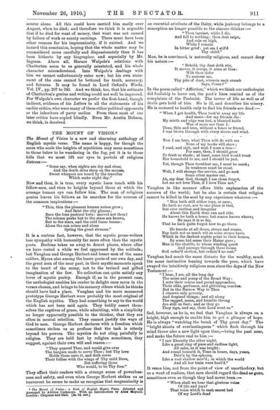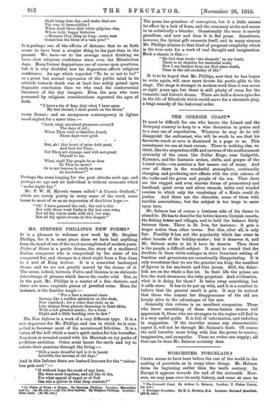THE MOUNT OF VISION.*
The Mount of Vision is a new and charming anthology of English mystic verse. The name is happy, for though the seers who scale the heights of mysticism may seem sometimes to those below to be wandering in the fog, yet it is to those
hills that we must lift our eyes in periods of religious distress :—
" Some say, when nights are dry and clear,
And the death dews sleep on the morass, Sweet whispers are heard by the traveller Which make night day."
Now and then, it is true, every mystic leses touch with his fellow-men, and rises to heights beyond those at which the average human eye can follow him. The man of religious genius leaves his fellows as he searches for the sources of the common inspirations :--
"Thin, thin the pleasant human noises grow; And faint the city gleams;
Rare the lone pastoral huts : marvel not thou! The solemn peaks but to the stars are known, But to the stars, and the cold lunar beams • Alone the sun arises and alone Spring the great streams."
It is a curious fact, however, that the mystic prose-writers lose sympathy with humanity far more often than the mystic poets. Boehme takes us away to desert places, where after
we have rested a while we feel oppressed by the solitude ; but Vaughan and George Herbert and lesser men of the same calibre, Myers also among the lesser poets of our own day, and the great men of the near past, in their, mystic moments speak to the heart of the many, not to the trained and gifted imagination of the few. No collection can quite satisfy any
lover of mystic poetry. Enough if, as in the present case, the anthologist enables his reader to delight once more in the verses chosen, and brings to his memory others which he thinks should have had a place. Vaughan and his more mannered prototype George Herbert were probably the most original of the English mystics. They had something to say to the world which has not been said again. They boldly assert them- selves the captives of grace, while admitting, with a simplicity
no longer apparently possible to the thinker, that they are often in mental rebellion. They cannot justify the ways of God to men. George Herbert declares with a freedom which sometimes strikes us as profane that the task is utterly beyond his powers. The mystics do not cling painfully to religion. They are held fast by religion sometimes, they suggest, against their own will and reason :—
" They quarrel Thee, and would give over
The bargain made to servo Thee ; but Thy love Holds them unto it, and doth cover Their follies with the wings of Thy mild Dove, Not suffering those Who would, to be Thy foes?'
They affect their readers with a strange sense of powerless- ness and safety, and even when George Herbert strikes us as irreverent he seems to make us recognise that magnanimity is • The Mount of Vision : a Book of English Mystio Vorss. Selected and Arranged by Adeline Cashmore. With an Introduction by Alio* Meynoll. London : Chapman and Hall. [s. 6d. net.] an essential attribute of the Deity, while jealousy belongs to a conception no longer possible to the sincere thinker :— "Thou tarriest, while I die,
And fall to nothing: thou dost reign, And rule on high, While I remain
In bitter grief : yet am I stird
Thy child."
Man, be is convinced, is naturally religious, and cannot deny
his nature
" Behold, thy dust doth stir, It moves, it creeps, it aims at thee : Wilt thou defer To succour me, Thy pile of dust, wherein each crumb
Says, Come ? "
Ii the poem called "Affliction," which we think our anthologist did foolishly to leave out the poet's lines remind us of the complaints of the Psalmist. The terror of life as well as of death gets hold of him. He is ill, and describes his misery. He is restored to health only to find his friends are dead :—
" When I got health, Thou took'st away my life And more—for my friends die :
My mirth and edge was lost, a blunted knife Was of more use than I: Thus, thin and lean, without a fence or friend, I was blown through with every storm and wind.
Now I am here, what Thou wilt do with me None of my books will show'
-
I read, and sigh, and wish I were a tree'—
For sure, then, I should grow To fruit or shade ; at least, some bird would trust Her household to me, and I should be just.
Yet, though Thou troublest me, I must be meek; In weakness must be stout. Well, I will change the service, and go seek Some other master out.
Ah, my dear God, though I am clean forgot, Let me not love Thee, if I love Thee not.'
Vaughan in like manner offers little explanation of the
sorrows of the world; but he also is certain that religion cannot be killed in the soul by any experience whatever
"Man hath still either toys, or care; He hath no root, nor to one place is tied,
But ever restless and irregular About this Earth done run and ride.
He knows he bath a home, but scarce knows where ; He says it is so far,
That he hath quite forgot how to go there.
He knocks at all doors, strays and roams, Nay hath not so much wit as some stones have, Which in the darkest nights point to their homes, By some hid sense their Maker gave ; Man is the shuttle, to whose winding quest
And passage through these looms God order'd motion, but ordain'd no rest."
Vaughan had much the same distaste for the wealthy, much the same instinctive leaning towards the poor, which have swayed the intuitively religious man since the days of the New Testament :— -
"I hear, I see, all the long day
The noise and pomp of the Broad Way : I note their coarse and proud approaches, Their silks, perfumes, and glittering coaches. But in the Narrow Way to Thee I observe only poverty, And despised things; and all along The ragged, mean, and humble throng Are still on foot; and as they go They sign, and say, their Lord went so."
Sad, however, as he is, we feel that Vaughan is always on a height, high enough to enable him to get a glimpse of hope. He is always "watching the break of Thy great day." The "bright shoots of everlastingness" which flash through his
mind throw also a new light upon time,—bring the past near, and make the future real to him :—
" I saw Eternity the other night,
Like a great ring of pure and endless light, All calm, as it was bright: And round beneath it, Time in hours, days, years, Driv'n by the spheres, Like a vast shadow mov'd ; in which the world And all her train were hurrd."
It vexes him, not from the point of view of unorthodoxy, but as a want of realism, that men should regard the dead as gone, sometimes even as though they had never:beep.
"When shall we hear that glorious voice
Of life and joys?
That voice *hick to each secret bed
Of my Lord's dead
Shall bring true day, and make dust see The way to immortality ?
When shall those first white pilgrims rise, Whose holy, happy histories —Because they sleep so long—some men Count but the blots of a vain pen ?"
It is perhaps one of the effects of distance that to us faith seems to have been a simpler thing in the past than in the
present. We have—or to the average man's thinking we have—lost religious confidence since even the Elizabethan days. Many former dogmatisms are of course open questions, but it is very doubtful how far dogmatism affects religious confidence. An age which regarded "To be or not to be ?"
as a great but normal expression of the public mind in its attitude towards death was at least less safely poised upon dogmatic conclusion than we who read the controversial literature of the day imagine. Even the men who were possessed by religious considerations regretted the ages of faith.
"I have a sin of fear, that when I have spun My last thread, I shall perish on the shore,"
wrote Donne ; and an anonymous contemporary in lighter mood sighed for a surer time :— " Lord, what unvalued pleasures crown'd The days of old ;
When Thou wert so familiar found, Those days were gold.
But, ah ! this heart of mine doth pant, And beat for Thee ; Yet Thou art strange, and wilt not grant Thyself to me.
What, shall Thy people be so dear To Thee no more ?
Or is not heaven to earth as near As heretofore ? "
Perhaps the same longing for the past attacks each age, and perhaps no age and no individual is without moments which "make night day."
Mr. F. W. H. Myers's verses called "A Cosmic Outlook," which are surely poetry in every sense of the word, come home to most of us as an expression of deathless hope :—
"Oh! I have guessed the end; the end is fair. Not with these weak limbs is thy last race run ; Not all thy vision sinks with this low sun; Not all thy spirit swoons in this despair."



















































 Previous page
Previous page